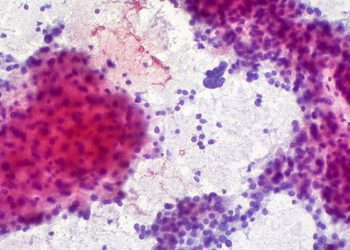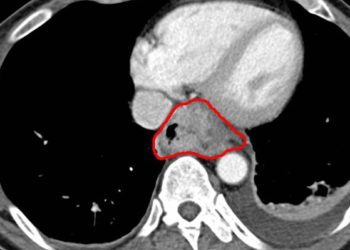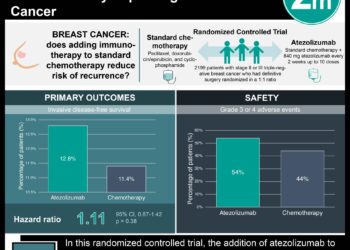Enzalutamide treatment increases median overall survival in non-metastatic prostate cancer
1. Enzalutamide along with androgen-deprivation therapy was shown to significantly increase median overall survival among men with non-metastatic, castration-resistant prostate cancer.
2. Adverse events for enzalutamide and androgen-deprivation therapy were shown to be consistent with the established safety profile of enzalutamide.
Evidence Rating Level: 1 (Excellent)
Study Rundown: Enzalutamide is an approved therapy for non-metastatic, castration-resistant prostate cancer on the basis of a lower risk for metastasis or death without radiographic progression. Furthermore, enzalutamide therapy is associated with a better quality of life and a lower risk of prostate specific antigen (PSA) progression. However, overall survival, which is an important end point and standard for regulatory approval, had not been reached for proper analysis by the end of the clinical trial. As such, this study analyzed the overall survival for enzalutamide therapy for non-metastatic, castration-resistant prostate cancer. The participants were randomized to receive enzalutamide or placebo-controlled treatment. The study determined the patients in the enzalutamide group had significantly longer medial overall survival compared to patients in the placebo-controlled group. Patients in the enzalutamide group experienced adverse events such as musculoskeletal events, cardiovascular events, and strokes at similar rates as previously reported.
This randomized trial was limited by the imaging modalities used in the study for disease diagnosis and monitoring patients’ conditions, as they were not the most sensitive techniques available for cancer detection of metastasis. Another limitation of the study was that data for time to progression for patients who received enzalutamide were not collected. Therefore, an evaluation could not be conducted on whether treatment with enzalutamide also translated to differences in treatment effect of subsequent therapies. Nonetheless, this study was strengthened by its long-term patient follow-up and matched patient characteristics between both groups. For physicians, the findings of this study highlight an additional treatment for patients with non-metastatic, castration-resistant prostate cancer.
Click to read the study in NEJM
Relevant Reading: Enzalutamide in Men with Nonmetastatic, Castration-Resistant Prostate Cancer
In-Depth [randomized controlled trial]: This randomized control trial enrolled 1401 patients in a multicenter study from 300 sites in 32 countries. Inclusion criteria included males who were 18 years of age or older, histologically confirmed adenocarcinoma of the prostate and ongoing androgen-deprivation therapy. The exclusion criteria for the study included history of cytotoxic chemotherapy, use of hormonal or biologic therapy for prostate cancer, and known or suspected brain metastasis. The patients were randomized to the enzalutamide or placebo-controlled treatment group in a 2:1 ratio. The primary outcome was overall survival. Overall survival was defined as the time from randomization to death from any cause. Additionally, adverse outcomes within both treatment groups were recorded. The median overall survival was significantly longer with enzalutamide treatment (67.0 months, 95% confidence interval [CI], 64.0 to not reached) compared to placebo-controlled treatment (56.3 months, 95% CI, 54.4 to 63.0). At the end of three years, 80% (95% CI, 77 to 83) of patients were alive in the enzalutamide group and 73% (95% CI, 69 to 77) of patients were alive in the placebo-controlled group. Enzalutamide in addition to androgen-deprivation therapy significantly lowered risk of death by 27% compared to the placebo group (hazard ratio, 0.73; 95% Ci, 0.61 to 0.89; P=0.001). Furthermore, serious adverse events occurred with steeper rate of initial onset in the enzalutamide group compared to the sorafenib group. The most common adverse event leading to death with enzalutamide treatment was cardiovascular events (2%), which was consistent with the known safety profile for enzalutamide. Taken together, administration of enzalutamide treatment plus androgen-deprivation therapy significantly increased median overall survival in patients with non-metastatic, castration-resistant prostate cancer.
Image: PD
©2020 2 Minute Medicine, Inc. All rights reserved. No works may be reproduced without expressed written consent from 2 Minute Medicine, Inc. Inquire about licensing here. No article should be construed as medical advice and is not intended as such by the authors or by 2 Minute Medicine, Inc.






